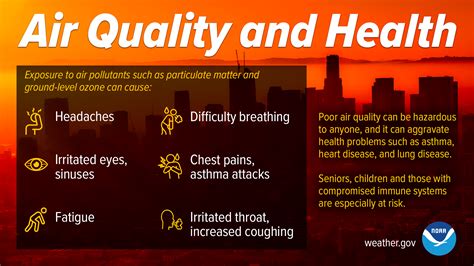Ventura, a picturesque coastal city in California, is known for its beautiful beaches, outdoor recreational opportunities, and a relaxed, small-town ambiance. However, like many areas in Southern California, Ventura faces challenges related to air quality. The combination of geographical factors, such as being situated in a coastal basin, and anthropogenic sources of pollution, contribute to periods of poor air quality. Understanding the extent and implications of Ventura’s air quality is crucial for both residents and visitors, especially those with pre-existing health conditions.
Geographical and Climatic Factors
Ventura’s location in a coastal basin can lead to the trapping of pollutants. During certain weather conditions, such as temperature inversions, pollutants can become trapped close to the ground, exacerbating air quality issues. Additionally, the city’s proximity to the Los Angeles metropolitan area means that it can be affected by the larger region’s air pollution, which is often severe due to the high population density and extensive vehicular traffic.
Sources of Air Pollution
Vehicular Emissions: Cars, trucks, and other vehicles emit a significant amount of pollutants, including particulate matter (PM), nitrogen oxides (NOx), volatile organic compounds (VOCs), and carbon monoxide (CO). These pollutants can contribute to the formation of ground-level ozone and fine particulate matter, both of which are harmful to human health.
Agricultural Activities: Ventura County is renowned for its agricultural production, including avocados, strawberries, and citrus fruits. While beneficial economically and culturally, agricultural activities can generate dust and emit VOCs from pesticide and fertilizer use, contributing to local air quality issues.
Industrial and Commercial Activities: Although not as predominant as in larger metropolitan areas, industrial and commercial activities in and around Ventura can release pollutants into the air, including solvents, paints, and other chemicals used in manufacturing and construction.
Wildfires: Southern California is prone to wildfires, which can dramatically worsen air quality. The smoke from these fires contains harmful pollutants like PM, VOCs, and polycyclic aromatic hydrocarbons (PAHs), posing significant health risks to those exposed.
Health Impacts of Poor Air Quality
The health effects of air pollution can be severe and varied, affecting different people in different ways. Some of the most common health impacts include:
- Respiratory Issues: Air pollutants like PM, ozone, and NOx can irritate the lungs, exacerbate asthma, and increase the risk of respiratory infections.
- Cardiovascular Disease: Long-term exposure to poor air quality has been linked to an increased risk of heart disease, strokes, and other cardiovascular conditions.
- Neurological Effects: Some air pollutants have been associated with neurological damage and an increased risk of neurodegenerative diseases.
- Cancer Risk: Certain air pollutants, such as PAHs and VOCs, are known or suspected carcinogens, meaning they may increase the risk of cancer.
Protective Measures and Improvements
Despite the challenges, there are steps being taken to improve and protect Ventura’s air quality:
- Regulatory Efforts: Local, state, and federal regulations aim to reduce emissions from vehicles, industries, and agricultural activities. For example, California has set stringent standards for vehicle emissions and is promoting the adoption of electric vehicles.
- Clean Energy Initiatives: Transitioning to cleaner energy sources, such as solar and wind power, can significantly reduce reliance on fossil fuels and decrease air pollution.
- Public Awareness and Education: Educating the public about the importance of air quality and the simple actions they can take to improve it, such as using public transport, carpooling, or avoiding intense physical activity during peak pollution hours, is crucial.
Personal Health Guide
For individuals living in or visiting Ventura, taking personal measures to minimize exposure to poor air quality is essential:
- Stay Informed: Check daily air quality forecasts to plan your activities accordingly.
- Use Air Purifiers: Indoor air purifiers can help reduce your exposure to pollutants when outdoor air quality is poor.
- Choose Cleaner Transportation: Opt for electric or hybrid vehicles, use public transport, walk, or bike when possible.
- Support Clean Air Policies: Advocate for local and regional policies that promote clean energy and reduce emissions.
- Maintain Healthy Habits: Regular exercise, a balanced diet, and avoiding smoking can help strengthen your lungs and overall health, making you more resilient to the effects of air pollution.
Conclusion
While Ventura faces challenges related to air quality, understanding the sources of pollution, the health impacts, and taking proactive measures can help mitigate these effects. By supporting clean air initiatives, making informed personal choices, and staying aware of air quality conditions, we can work towards a healthier, more sustainable environment for everyone in Ventura.
What are the primary sources of air pollution in Ventura, California?
+The primary sources of air pollution in Ventura include vehicular emissions, agricultural activities, industrial and commercial operations, and periodic wildfires. Each of these sources contributes different types of pollutants to the air, affecting both air quality and human health.
How can I protect myself from poor air quality in Ventura?
+Protecting yourself from poor air quality involves staying informed about current air quality conditions, using air purifiers, choosing cleaner modes of transportation, supporting policies that reduce emissions, and maintaining healthy lifestyle habits. Additionally, planning outdoor activities during times of better air quality and avoiding strenuous exercise when air quality is poor can help minimize exposure.
What role do geographical factors play in Ventura's air quality?
+Ventura's location in a coastal basin can trap pollutants, especially during weather conditions like temperature inversions. This geographical feature, combined with its proximity to the heavily populated Los Angeles area, contributes to the complexity of managing and improving air quality in Ventura.
By acknowledging the challenges and opportunities related to air quality in Ventura, we can foster a community that prioritizes health, sustainability, and environmental stewardship, ensuring a better quality of life for its residents and a healthier planet for future generations.



